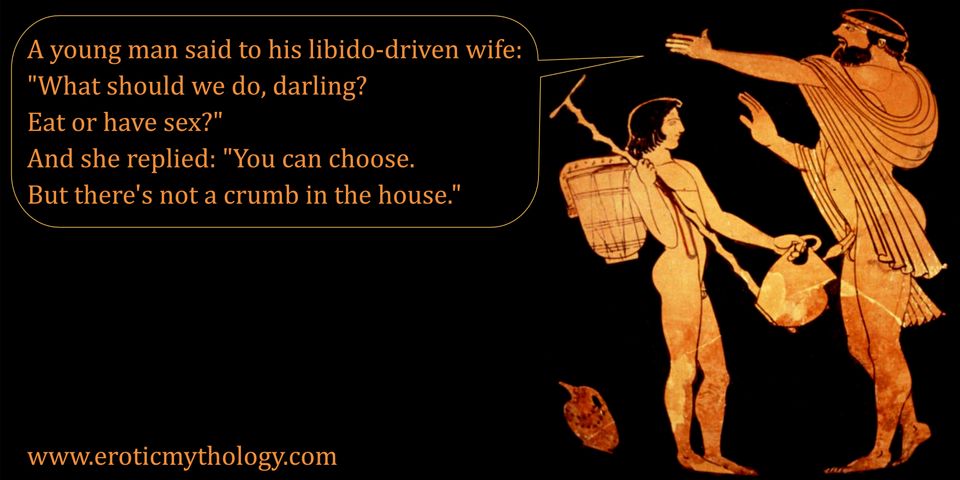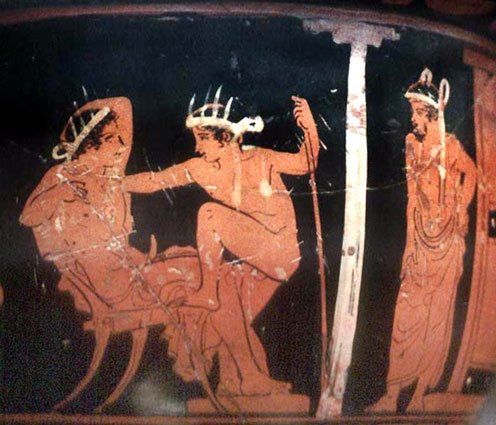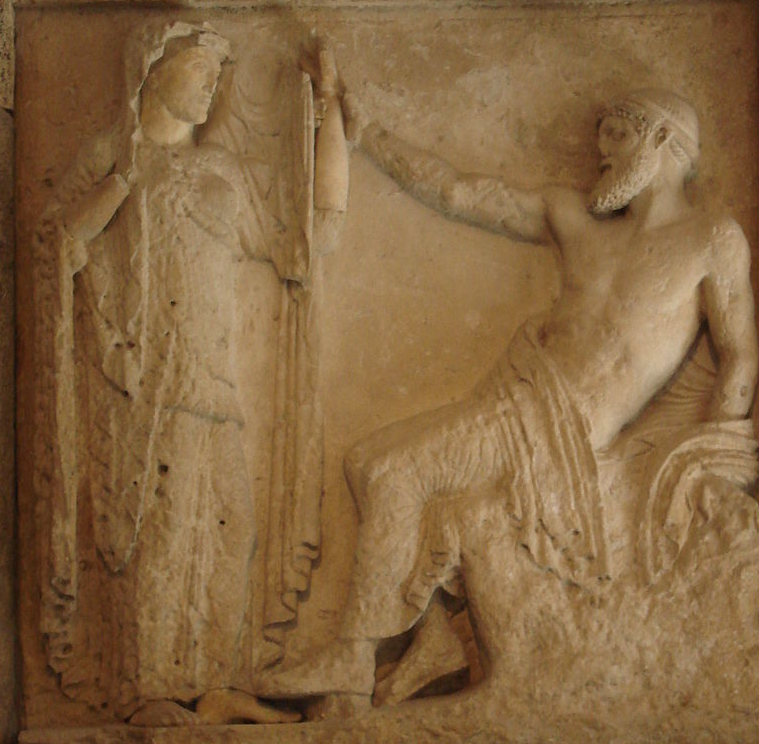Ancient Erotica: Sex Jokes

People in the ancient world enjoyed a good laugh just as much as we do today. There were joke books in ancient Greece, jokes immortalised on papyrus from ancient Egypt and the oldest joke in the world was written on Sumerian stone tablets in Babylonia. Farts, sex, relationships and stupid people were just as popular in ancient comedy as they are today.
What follows is a collection of ancient dirty jokes that I personally find pretty funny, even though they are all well over 1000 years old.
1. Anglo-Saxon Men poke a Hole
"What hangs at a man's thigh and wants to poke the hole that it's often poked before?"
Answer: A key
This is the oldest recorded British joke, preserved for posterity by the Codex Exoniensis, a 10th century Anglo-Saxon poetry book.
2. Stand up in Bed
I am a wondrous creature for women in expectation, a service for neighbors. I harm none of the citizens except my slayer alone. My stem is erect, I stand up in bed, hairy somewhere down below. A very comely peasant's daughter, dares sometimes, proud maiden, that she grips at me, attacks me in my redness, plunders my head, confines me in a stronghold, feels my encounter directly, woman with braided hair. Wet be that eye.
Answer: Onion
This suggestive riddle is from the same source as the first one, the Codex Exoniensis.
3. Half Brother
A provincial man has come to Rome, and draws everyone's attention, because he looks a real double of the emperor Augustus. The emperor has him brought to the palace, looks at him and then asks:
"Tell me, young man, did your mother come to Rome anytime?"
He replies:
"She never did. But my father frequently came here."
Macrobius Ambrosius Theodosius, Saturnalia, 5th century CE
4. Shut his Mouth
Lysidamus, the dominus or patriarch of the house, has been insulted by one of his two slaves, Chalinus and Olympio. When Lysidamus yells, “Silence Chalinus!” Chalinus points to Olympio and says, “Get your arms around that fellow.” Olympio promptly retorts: “No, sir! About that fellow, that's learned to like it.”
(Translation by Paul Nixon)
Alternative translations of the same joke are:
Lysidamus: Silence Chalinus!
Chalinus: Stick it to him!
Olympio: No, to him — he likes the receiving end of that.
(Translation by David Christenson)
Lysidamus: Silence Chalinus!
Chalinus: Subdue that chap.
Olympio: No, subdue that one: he has learned how to submit.
(Translation by Wolfgang de Melo)
This exchange comes from the Roman play Casina by Titus Maccius Plautus, ca. 185 BCE.
5. The horny Wife
A young man said to his libido-driven wife: "What should we do, darling? Eat or have sex?" And she replied: "You can choose. But there's not a crumb in the house."
The lustful woman was a popular trope in comedy until the Victorian era thoroughly destroyed it. This joke comes from the Philogenos, the oldest surviving collection of jokes from the 4th or 5th century AD. The book contains 265 jokes written in ancient Greek.
6. Who's your Daddy?
A man, just back from a trip abroad, went to a fortune-teller. He asked about his family, and the incompetent fortune-teller replied: "Everyone is fine, especially your father." When the man objected that his father had been dead for ten years, the fortune-teller said: "You have no clue who your real father is."
This joke is also from the Philogelos, a collection of 265 jokes from the 4th or 5th century CE.
7. Eunuch Children
An Abderite asks a eunuch how many children he has. The eunuch explains that you need testicles to be able to have children.
"Well," says the Abderite, "you can always buy a pair at the butcher's shop!"
An Abderite is a native or inhabitant of the ancient city of Abdera. They were, obviously, the Irishmen (or Englishmen, of course, if in Ireland or Scotland) of ancient Greece. So much so, that to this day the other meaning of the word Abderite is 'simpleton'. The joke is also from the Philogelos.
8. Weep, Girls
Weep, you girls. My penis has given you up. Now it penetrates men's behinds. Goodbye, wondrous femininity!
This gem is a graffiti from the bar/brothel of Innulus and Papilio in Pompeii, conserved by the eruption of Mount Vesuvius in 79 CE.
9. Longing for a Man
Dionysos: [As] I'm reading to myself the Andromeda, a sudden pang of longing shoots through my heart, you can't conceive how keenly.
[...]
Herakles: Caused by a woman?
Dionysos: No.
Herakles: A boy?
Dionysos: No, no.
Herakles: A man?
Dionysos: Ah! Ah!*
*αταται (atatai) in the original Greek, a cry extorted by a sharp pang, usually of pain, but occasionally of pleasure or desire
Herakles: Was it for Cleisthenes? [a politician in Athens]
Dionysos: Don't mock me, brother!
The joke here is that Dionysos is longing for Euripides, who is, in fact, a man, and Herakles mistaking his words to be of a sexual nature while Dionysos, as is revealed in the following lines, misses his skills as a poet: "I want a genuine poet, for some are not and those that are, are bad."
The dialogue is from the comedy play "The Frogs" by Aristophanes, produced in 405 BC. It's really funny, even to someone like me who doesn't understand all the references to other plays. Reading highly recommended!
10. I'll call Father
Eumolpus was lodging in Pergamon at the house of a family with a beautiful son. After cajoling the boy with generous gifts, his young lover took a liking to their sexual activity. Eumolpus gave him what he wanted, and then dropped asleep after the third time, worn out with pleasure. Less than an hour had passed before the boy started pinching his older lover and asking, ‘Eh! why are we not at work?' Hereupon, sick to death of being so often disturbed, Eumolpus flew into a rage: ‘Go to sleep,' he cried, ‘or I'll tell your father!'
The source of this is the Satyricon, written in the late 1st century CE and basically a roadtrip story of sexual encounters.
11. Sex for Free
Lesbia swears she’s never been fucked for free.
True. When she wants to be fucked, she has to pay.
Alternative translation:
Lesbia swears that she has never slept with a man for free.
It’s true. When she wants sex, she usually pays for it.
This is an epigram written by Roman poet Marcus Valerius Martialis, known in English as Martial, in Book XI of his 12 books of Epigrams. The books were published in Rome between the years 86 and 103 CE. His epigrams' biting and often scathing sense of wit made him the first insult comic. He even turned his pen against the people who sponsored him to write.
Lesbia, meaning "woman from Lesbos" in Latin, was the name used by Latin poet Catullus as a pseudonym for the woman he loved, who is commonly identified as Clodia Metelli.
12. Lucky Find
I was very much in love with the virgin Alkippe, and one day I persuaded her and held her secretly on the bed. Both our hearts were pounding, lest anyone should come by, lest anyone see the secrets of our surpassing passion. But her mother noticed the chattering bed and looked in suddenly and said "Share your Hermes, daughter".

Hermes is, among many other things, the god of the lucky find. So the mother tells her daughter to share her "lucky find". There is, however, another meaning, making this a pun: since the narrator and Alkippe are already at it, judging from the chattering bed, he his most likely naked and erect, resembling a different kind of Hermes: a simple sculpture with a head and erect penis, in English a herm.
This is a Greek epigram explained on Ioci Antiqui: Ancient Jokes by Michael Hendry.
13. Unfinished
Sertorius starts everything, finishes nothing.
When he fucks, I suspect, he never ends.
This is also an epigram by Marcus Valerius Martialis (Martial), in Book III of his 12 books of Epigrams.
14. Four Times
"I can perform four times in one night, but I’ll be damned If I can manage once in four years with you, Telesilla."
Una nocte quater possum: sed quattuor annis si possum, peream, te Telesilla semel.
This boast is, of course, by everyone's favourite Gentleman Marcus Valerius Martialis (Martial). I came across it through this tweet by sententiae antiquae.
Check out his blog here!
15. Distaffs
A courtesan was reproached by another woman for disliking work, and not employing herself in spinning.
Her reply:
"Although I am what you see, yet, in this short time, I have already finished three distaffs."
This is a play on words that can't be reproduced in English.
The Greek καθεῖλον ἱστούς can mean "finished three distaffs" but also "lowered three masts," or "debauched three sailors."
Thank you, Serena Jenk, for telling (and explaining) that joke!
The episode is related by Strabo in his work "Geography" when he talks about the city of Corinth.
The Sumerian fart joke, by the way, goes like this:
What has never happened, ever: A young wife has not farted in her husband's lap.
Oldest recorded joke in the world, folks.
Sources:
- BBC: Flatulence joke is world's oldest
- Diotima: 45 Jokes from the Philogelos, translated by John T. Quinn
- Philogelos, "The Laugh Addict", translated by Prof. William Berg
- IOCI ANTIQVI - Ancient Jokes by Michael Hendry
- Casina by Plautus, in Latin and English, translation by Paul Nixon
- Review by Natalia Tsoumpra of David Christenson, Hysterical Laughter: Four Ancient Comedies about Women: Lysistrata, Samia, Casina, Hecyra.
- Ancient Graffiti from Pompeii
- The Frogs by Aristophanes, in Greek and English, translation by Benjamin Bickley Rogers
- Satyricon by Petronius, translation by Alfred R. Allinson
- Selected Epigrams by Martial, translation by A. S. Kline
- Martial Translation Tweet by sententiae antiquae
- Geography by Strabo, Book VIII, Chapter VI, Section 20



